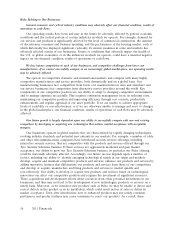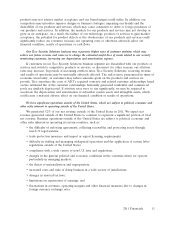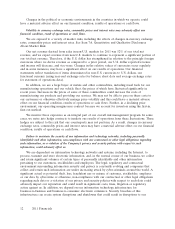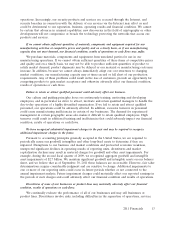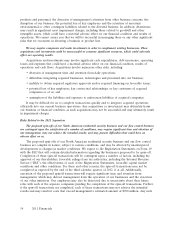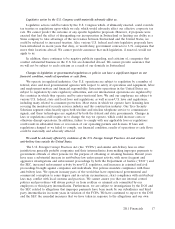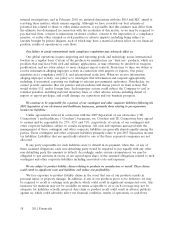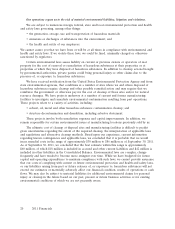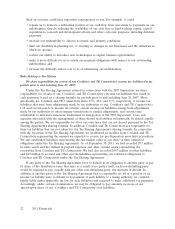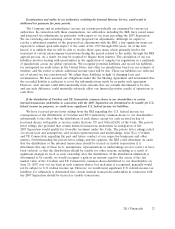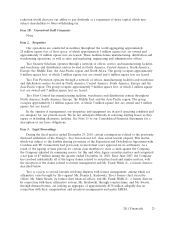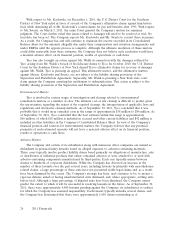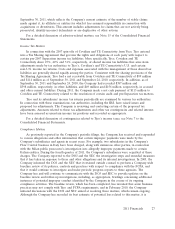ADT 2011 Annual Report Download - page 120
Download and view the complete annual report
Please find page 120 of the 2011 ADT annual report below. You can navigate through the pages in the report by either clicking on the pages listed below, or by using the keyword search tool below to find specific information within the annual report.Legislative action by the U.S. Congress could materially adversely affect us.
Legislative action could be taken by the U.S. Congress which, if ultimately enacted, could override
tax treaties or regulations upon which we rely, which would adversely affect our effective corporate tax
rate. We cannot predict the outcome of any specific legislative proposals. However, if proposals were
enacted that had the effect of disregarding our incorporation in Switzerland or limiting our ability as a
Swiss company to take advantage of the tax treaties between Switzerland and the United States, we
could be subjected to increased taxation. Also, various U.S. federal and state legislative proposals have
been introduced in recent years that deny, or would deny, government contracts to U.S. companies that
move their locations abroad. We cannot provide assurance that such legislation, if enacted, would not
apply to us.
In addition, there continues to be negative publicity regarding, and criticism of, companies that
conduct substantial business in the U.S. but are domiciled abroad. We cannot provide assurance that
we will not be subject to such criticism as a result of our domicile in Switzerland.
Changes in legislation or governmental regulations or policies can have a significant impact on our
financial condition, results of operations or cash flows.
We operate in regulated industries. Our U.S. operations are subject to regulation by a number of
federal, state and local governmental agencies with respect to safety of operations and equipment, labor
and employment matters and financial responsibility. Intrastate operations in the United States are
subject to regulation by state regulatory authorities, and our international operations are regulated by
the countries in which they operate and by extra-territorial laws. We and our employees are subject to
various U.S. federal, state and local laws and regulations, as well as non-U.S. laws and regulations,
including many related to consumer protection. Most states in which we operate have licensing laws
covering the monitored security services industry and the construction industry. Our Tyco Security
Solutions segment relies heavily upon both wireline and wireless telephone service to communicate
signals, and these technologies are regulated by both the federal and state governments. Changes in
laws or regulations could require us to change the way we operate, which could increase costs or
otherwise disrupt operations. In addition, failure to comply with any applicable laws or regulations
could result in substantial fines or revocation of our operating permits and licenses. If laws and
regulations changed or we failed to comply, our financial condition, results of operations or cash flows
could be materially and adversely affected.
We could be adversely affected by violations of the U.S. Foreign Corrupt Practices Act and similar
anti-bribery laws outside the United States.
The U.S. Foreign Corrupt Practices Act (the ‘‘FCPA’’) and similar anti-bribery laws in other
jurisdictions generally prohibit companies and their intermediaries from making improper payments to
government officials or other persons for the purpose of obtaining or retaining business. Recent years
have seen a substantial increase in anti-bribery law enforcement activity, with more frequent and
aggressive investigations and enforcement proceedings by both the Department of Justice (‘‘DOJ’’) and
the SEC, increased enforcement activity by non-U.S. regulators, and increases in criminal and civil
proceedings brought against companies and individuals. Our policies mandate compliance with these
anti-bribery laws. We operate in many parts of the world that have experienced governmental and
commercial corruption to some degree and in certain circumstances, strict compliance with anti-bribery
laws may conflict with local customs and practices. We cannot assure you that our internal control
policies and procedures will always protect us from reckless or criminal acts committed by our
employees or third party intermediaries. Furthermore, we are subject to investigations by the DOJ and
the SEC related to allegations that improper payments have been made by our subsidiaries and third
party intermediaries in recent years in violation of the FCPA. We have continued to report to the DOJ
and the SEC the remedial measures that we have taken in response to the allegations and our own
2011 Financials 17





